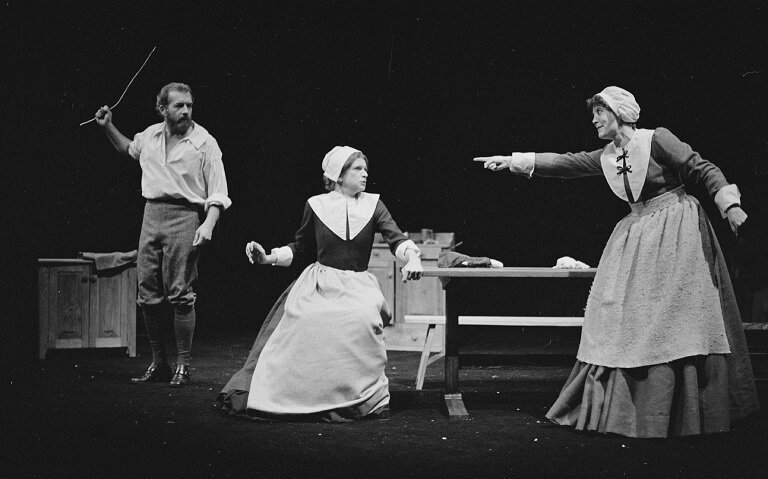Arthur Miller Had it Right: The Crucible and Cancel Culture
By Kathleen Hylen
In 1996 The New York Times interviewed Arthur Miller about the release of the newest film version of The Crucible. During the interview he stated, “It is only a slight exaggeration to say that, especially in Latin America, The Crucible starts getting produced wherever a political coup appears imminent, or a dictatorial regime has just been overthrown." Miller wrote The Crucible in 1953, in response to Senator Joseph McCarthy’s House of Unamerican Activities Committee (HUAC), an initiative designed to investigate individuals suspected of spreading communist ideology.
The Crucible is set in Salem, MA, during the 17th century witch trials. A group of young girls are caught dancing by the local preacher, after which, rumors of witchery are spread. The girls accuse each other and other townspeople in an attempt to defend themselves. The choice for the girls is to confess and destroy their reputations, in a place where reputations are important, or refuse and be hanged.
In 1987 while I was studying at UC Santa Cruz, The Crucible was put on. It was very apropos as, during that time, there was a lot of stigma against the gay community and HIV/AIDS was widely perceived to be a “gay disease.” Many termed it “God’s punishment on the gay community” and expressed sorrow for the innocent women and children who got the disease through “no fault of their own.” Celebrities and politicians did the same. Larry Speakes, President Regan’s Press Secretary, deflected questions about AIDS during a press conference with jokes about “fairies.” The roomful of reporters laughed at the term “gay plague.”
After the killing of George Floyd, I joined a Middlebury Institute of International Studies (MIIS) alumni group where our discussions on anti-racism and social justice issues often turned to the topic of Cancel Culture, which was being used by the left and right. We noticed there was no discussion happening – just a swift and public cancellation. Again it hit me, that connection between the finger-pointing demonstrated in the play and current events.
I wasn’t alone in associating Cancel Culture with The Crucible. I conducted a Google search of those words and found pages of opinion pieces. Each author focused on one celebrity or one reason - everyone who’s appeared in blackface, JK Rowling’ comments on transgender people and bathroom laws, a few talked about the role of power and celebrity status status in Cancel Culture and who actually gets canceled and who doesn’t, and why.
The questions that kept creeping up in those MIIS Alum talks, which have morphed into this Compassionate Courage group, were – Where is the forgiveness? Where is the compassion? Where is the dialogue? I’m emphatically not excusing racism or even bad behavior but, can we try to understand where people are coming from? And how do we have this dialogue? A particular focus was on cyberbullying as we were noticing more and more of it.
I decided to conduct another search, this time for “The Crucible and cyberbullying” and came upon a revision of the play, which adroitly demonstrates the connection between the finger-pointing of The Crucible and the naming and shaming of cyberbullying. The Burn, set in high school with a cast rehearsing The Crucible, centers around the bullying of a new girl in the school.
In that same article, Miller went on to say, “the play seems to present the same primeval structure of human sacrifice to the furies of fanaticism and paranoia that goes on repeating itself forever as though imbedded (sic) in the brain of social man.” That term “social man” struck me since social media holds the biggest sway in Cancel Culture. Our need to connect is actually polarizing us. Several of these authors mentioned that Cancel Culture has been going on since time immemorial and I agree, but I also believe that social media has unleashed our tendency to point fingers, because we can now do so anonymously.
Until recently, when you responded to an article you wrote a letter to the editor including your name, city and maybe job. Now, anyone can simply click at the bottom of an article and comment with instant publication. We create pseudonyms so that no one can identify us. We badger and bully.
The difference between The Crucible and Cancel Culture is that Miller wrote his play as a salvo against those with power who were trying to subjugate ordinary citizens. At the time the strongest union was in Hollywood, hence McCarthy attacked writers, celebrities, directors, etc. Now it seems that we ordinary citizens (and ironically celebrities) are calling out those who hold power or at least are perceived to, but the focus remains the same. It is on reputation and morality. Whether or not we agree on what “morality” is, we may be heading in the same direction as HUAC. Witch-hunting has become the norm.
Miller himself refused to name names when he appeared before the HUAC. I think we need to follow Miller’s example. Let’s stop naming and shaming and start dialoguing instead. This requires a lot of courage and compassion. I’d love to see someone respond to a Twitter post with a question, maybe one as simple as “what did you mean by that?”

